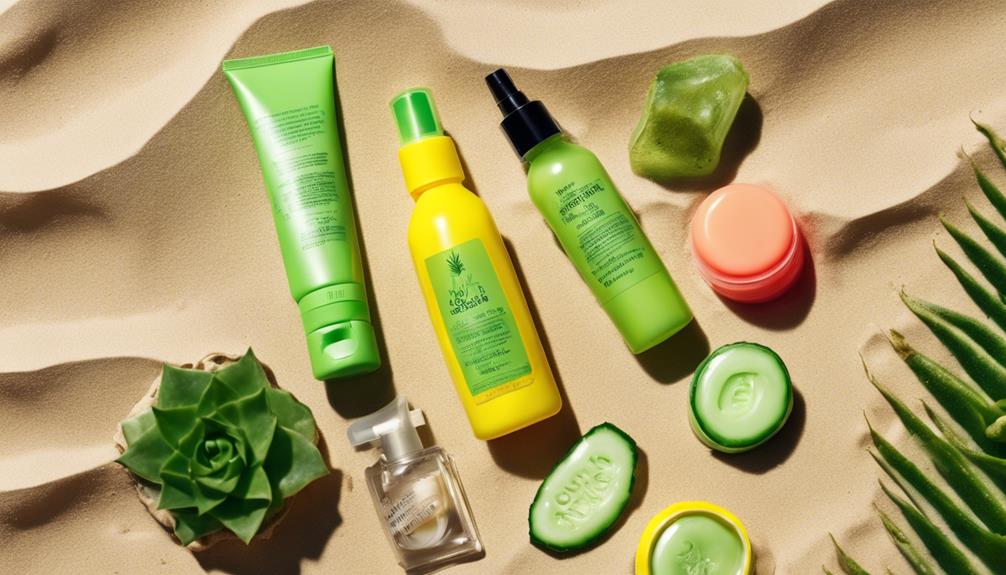Winter weather can activate your skin's hibernation mode, leaving it dry and dull. To wake it up, focus on hydration and moisture retention. Start with a heavy-duty moisturizer right after bathing to lock in hydration. Incorporate serums with hyaluronic acid for an added boost. Remember to hydrate from within by drinking plenty of water and consuming nutrient-rich foods. Gentle exfoliation helps remove dead skin cells, enhancing radiance. Look for products specifically designed for winter skincare to combat dryness effectively. By taking proactive steps, you can rejuvenate your skin and revive its natural glow, and there's more to explore on this topic.
Key Takeaways
- Apply thicker, oil-based moisturizers immediately after bathing to lock in hydration and protect against winter dryness.
- Stay hydrated by drinking at least 8 glasses of water daily and incorporating hydrating foods into your diet.
- Use gentle, sulfate-free cleansers to retain natural oils and prevent further drying of the skin.
- Regularly exfoliate to remove dead skin cells and enhance the absorption of moisturizers.
Signs Your Skin Is Hibernating
If you've noticed your skin feeling tight or looking dull, it might be hibernating due to the harsh winter conditions. Dry skin is a common issue during colder months, as the air holds less moisture, leading to discomfort and irritation. You may also experience redness and chapping, indicators that your skin's moisture barrier has been compromised.
Pay attention to increased itchiness or irritation, especially if you have conditions like eczema or psoriasis—these can worsen in winter. Moreover, a lack of radiance often signals that your skin's natural glow is muted from the dry environment. You might even find that your skin produces excess oil while still feeling dry; this is your skin's way of compensating for moisture loss.
To combat these signs of skin hibernation, consider using coconut oil as a moisturizer to help restore hydration. Don't forget about the importance of vitamin D during winter, as limited sunlight can affect your skin's health. By recognizing these signs, you can take proactive measures to wake your skin up from its winter slumber and restore its natural vibrancy.
Dangers of Skin Hibernation

When your skin goes into hibernation during winter, it risks becoming excessively dry and losing its natural radiance.
You might also find that pre-existing skin conditions flare up, causing irritation and discomfort.
Ignoring proper skincare now can make it harder for your skin to bounce back when spring arrives.
Skin Dryness Risks
Winter's cold air can quickly strip your skin of moisture, leading to dryness that risks cracking, itchiness, and chapping. As you navigate the chilly months, be mindful that low humidity levels can exacerbate skin dryness, leaving your skin feeling tight and uncomfortable.
When you step into a warm room after being outside, the rapid temperature change can cause your skin's capillaries to react, resulting in redness and inflammation.
You might find yourself reaching for comfort foods to warm up, but don't forget to nourish your skin, too. Incorporating hydrating ingredients like olive oil into your winter skincare routine can help lock in moisture and protect your skin barrier.
Remember, maintaining moisture isn't just a luxury; it's essential for preventing infections and other skin issues that can arise from dryness. If you ignore these risks, you could face a cycle of irritation and discomfort that complicates your winter experience.
Instead, take proactive steps to combat skin dryness and keep your skin healthy and glowing this season. Your skin deserves the extra attention during winter, so don't let it slip into hibernation mode.
Worsening Skin Conditions
Ignoring your skin's needs during the colder months can lead to a worsening of existing skin conditions, making irritation and discomfort even more pronounced. The winter months can exacerbate issues like acne and eczema, leaving your skin feeling tight and inflamed.
To keep your skin healthy, consider these essential tips:
- Hydrate Daily: Make sure you're moisturizing every day. Use heavy-duty moisturizers to combat dryness and protect your moisture barrier from the harsh elements.
- Watch Your Diet: Be mindful of your food choices. Increased sugar intake can trigger flare-ups, so incorporate skin-friendly foods like lean meats and veggies to promote healing.
- Establish a Routine: Stick to a consistent skincare routine with mild soaps and targeted treatments to manage your skin conditions effectively.
Loss of Radiance
Neglecting your skin during the colder months can lead to a loss of radiance, as the harsh conditions strip away moisture and necessity, leaving your complexion looking dull and lifeless. Cold winter air holds less moisture, which means your skin's oil production and hydration levels drop considerably. This lack of humidity, often made worse by indoor heating, can leave your skin feeling parched and looking lackluster.
Without the essential nutrients your skin craves, it's more vulnerable to dullness. If you already deal with skin conditions like eczema or acne, the cold can exacerbate these issues, further robbing your skin of its natural glow.
To combat skin hibernation, you need to incorporate heavy-duty moisturizers and hydrating serums into your routine. These products help restore moisture and vitality, ensuring your skin isn't just surviving but thriving.
Don't let winter take away your radiance; make a conscious effort to care for your skin. Remember, your skin has rights reserved to look its best, even during the coldest months. So, wake it up and bring back that vibrant glow!
Shock Treatments for Your Skin

Revitalize your skin this winter with shock treatments designed to combat dryness and restore hydration. These intensive approaches target the harsh effects of cold weather, ensuring your skin stays healthy and vibrant.
Here are three effective shock treatments to evaluate:
- Intensive Moisturizers: Look for products rich in hyaluronic acid or glycerin. These ingredients draw moisture into your skin, providing immediate relief from dryness.
- Exfoliating Treatments: Use gentle scrubs or chemical peels to remove dead skin cells. This step not only revitalizes dull skin but also enhances moisture absorption, making your skincare routine much more effective.
- Hydrating Serums: Incorporate a serum loaded with antioxidants. This will protect your skin from environmental stressors while promoting a brighter, healthier complexion.
Additionally, don't underestimate the power of regular facials focused on hydration and nourishing overnight masks. These can provide a concentrated boost, addressing common winter issues like chapping and flakiness.
Moisturizing Strategies for Winter

In winter, keeping your skin hydrated is vital, so you need to prioritize moisturizing.
Choosing the right products and layering them effectively can make a big difference in how your skin feels.
Let's explore some simple strategies to help you maintain that essential moisture all season long.
Importance of Hydration
Hydration is essential in winter, as cold air and indoor heating can sap moisture from your skin, leading to dryness and irritation. To combat this, you need to adopt effective moisturizing strategies that keep your skin hydrated.
Here are three key tips to help you maintain moisture during the winter months:
- Moisturize After Bathing: Apply your moisturizer immediately after bathing while your skin is still damp. This locks in hydration and enhances the effectiveness of your products.
- Choose Thicker Moisturizers: Opt for oil-based moisturizers, like olive oil or coconut oil. These thicker formulations create a protective barrier against harsh winter elements, keeping your skin nourished.
- Limit Hot Showers: Instead of indulging in hot showers, stick to lukewarm water. Hot water can strip your skin of its natural oils, exacerbating dryness.
Choosing the Right Products
Selecting the right products is essential for maintaining skin moisture and protection during the harsh winter months. To combat winter dryness, opt for moisturizers packed with hydrating ingredients like glycerin, hyaluronic acid, and ceramides. These ingredients help your skin retain moisture effectively.
Heavy-duty moisturizers containing oils such as olive oil, coconut oil, or sunflower oil are also critical, as they form a protective barrier against cold air and prevent moisture loss.
Be cautious when choosing products; avoid those with alcohol listed among the first three ingredients, since they can worsen dryness and irritation during winter. To maximize the effectiveness of your moisturizer, apply it immediately after bathing while your skin is still damp. This locks in hydration and enhances the product's benefits.
Don't forget about your lips! Incorporating lip care products, like Aquaphor or other emollient balms, is essential to prevent chapping and maintain hydration during cold weather.
Layering Moisturizers Effectively
Applying moisturizers in layers can greatly boost your skin's moisture retention during winter, ensuring it stays protected against harsh elements.
Start with a lightweight hydrating serum, then follow up with a thicker cream or ointment. This method not only seals in moisture but also creates a barrier against cold air.
Here are three effective strategies for layering moisturizers:
- Choose the Right Serum: Opt for a hydrating serum with ingredients like hyaluronic acid or glycerin. These components attract moisture to your skin and provide a solid foundation for hydration.
- Seal It In: After applying your serum, layer on a heavier cream containing occlusive agents like petrolatum or shea butter. This locks in the moisture and keeps your skin feeling soft and supple.
- Timing Matters: Apply your moisturizers immediately after bathing or washing your face. This helps trap water in your skin, enhancing overall hydration levels.
Don't forget to reapply throughout the day, especially on your hands and any exposed skin, to combat winter dryness effectively.
The Importance of Hydration

Staying well-hydrated is essential during winter to combat the increased dryness and discomfort that cold air brings to your skin. When you don't drink enough water, dehydration can exacerbate winter skin issues, leading to a loss of elasticity and overall skin health. Aim for at least 8 glasses (64 ounces) of water per day, but remember that your individual needs may vary based on your activity level and the environment.
In addition to drinking water, think about incorporating hydrating foods into your diet. Fruits and vegetables with high water content, like cucumbers, oranges, and watermelon, can help boost your hydration levels. These foods not only quench your thirst but also provide essential nutrients that support skin health.
Don't forget that moisture retention is key. Applying moisturizers immediately after bathing helps lock in hydration and prevents moisture loss. This simple step can make a significant difference in your skin's texture and appearance during the colder months.
Nutritional Support for Skin Health

How can you enhance your skin health during winter?
By focusing on a nutrient-rich diet that includes plenty of fruits, vegetables, and healthy fats, you can effectively combat dryness and maintain your skin's elasticity.
Here are some key dietary components to take into account:
- Fruits and Vegetables: These are packed with essential vitamins and antioxidants, which help fight skin dryness and promote a youthful appearance. Aim for a colorful variety to maximize your nutrient intake.
- Healthy Fats: Incorporate sources like nuts, seeds, and olive oil. These fats are essential for maintaining skin flexibility and moisture retention, especially in the colder months.
- Limit Sugar Intake: Reducing your sugar consumption can help prevent inflammation and skin issues that winter weather can exacerbate. Opt for whole, nutrient-dense foods like eggs, lean meats, and legumes to support skin repair and renewal.
Don't forget to stay hydrated! Drinking enough water is important for preventing dryness and irritation.
Daily Routines to Energize Skin

A revitalizing daily skin care routine can make all the difference in keeping your complexion energized and radiant during the winter months. Start each day by cleansing your skin and immediately applying a heavy-duty moisturizer to lock in hydration. This helps combat the dryness that winter brings.
Don't overlook the importance of exfoliation; use a gentle scrub weekly to remove dead skin cells and enhance cell turnover. This step is key to rejuvenating dull winter skin.
Hydration goes beyond topical products, so drink plenty of water throughout the day—aim for at least 8 glasses—to maintain skin elasticity and moisture levels.
Also, incorporate antioxidant-rich foods into your diet. Berries, nuts, and leafy greens can support skin health and fight oxidative stress caused by the cold.
Finally, make sure to apply sunscreen every day, even on cloudy days. UV rays can reflect off snow and still harm your skin.
Winter-Suitable Skincare Products

Selecting the right winter-suitable skincare products is essential for maintaining hydration and protecting your skin from the harsh elements. As temperatures drop, you need to adjust your routine to combat dryness effectively. Here are three key types of products to include in your winter skincare arsenal:
- Moisturizers with Humectants: Look for ingredients like glycerin and hyaluronic acid, which attract and retain moisture in your skin, giving it the hydration it craves during winter.
- Heavier Oil-Based Moisturizers: Incorporate creams rich in shea butter or ceramides. These create a protective barrier against cold air, preventing moisture loss and keeping your skin soft.
- Gentle Cleansers: Choose sulfate-free, cream-based cleansers to avoid stripping your skin of its natural oils. This will help maintain your skin's moisture levels while providing a nourishing touch.
And don't forget to apply sunscreen! UV rays still impact your skin in winter, especially with snow reflecting sunlight. A broad-spectrum SPF in your daily moisturizer can safeguard your skin year-round.
Embrace these products, and your skin will thank you.
Natural Remedies to Revive Skin

While heavy-duty moisturizers can work wonders, natural remedies can also revive your skin and provide extra hydration during the winter months. Incorporating these simple ingredients into your routine can make a significant difference in combating dryness.
Here's a quick reference table for some effective natural remedies:
| Natural Remedy | Benefits | How to Use |
|---|---|---|
| Aloe Vera | Soothes irritation, hydrates skin | Apply fresh aloe gel directly to your skin and leave it for 20 minutes. |
| Honey | Antibacterial, deeply moisturizing | Mix honey with a splash of warm water to create a mask; apply for 15-20 minutes. |
| Coconut Oil | Locks in moisture, nourishes skin | Massage a small amount into your skin after showering to seal in hydration. |
Don't forget to stay hydrated by drinking plenty of water, as proper hydration plays an essential role in maintaining your skin's health. Also, consider using lip care products like Aquaphor to prevent chapping. By integrating these natural remedies into your winter skincare routine, you'll give your skin the revival it needs.
Long-Term Skin Care Practices

Establishing long-term skin care practices is essential for maintaining healthy, hydrated skin throughout the winter months. By focusing on a consistent routine, you can effectively combat dryness and keep your skin looking its best.
Here are three key practices to incorporate into your winter skin care regimen:
- Moisturize Regularly: Use heavy-duty products like olive oil or petroleum-based creams. Apply them right after bathing to lock in moisture. Opt for lukewarm water to avoid further drying out your skin.
- Nourish from Within: Incorporate omega-3 fatty acids and antioxidants into your diet. A balanced intake of fruits, vegetables, and healthy fats will support your skin's flexibility and overall health during the colder months.
- Protect and Exfoliate: Don't skip sunscreen, even on cloudy days, as UV rays can still harm your skin. Additionally, practice gentle exfoliation and consider regular facials to combat dullness and promote a rejuvenated complexion.
Frequently Asked Questions
How Do You Wake up From Hibernation?
To wake up from hibernation, you need to gradually increase your activity levels, expose yourself to natural light, and nourish your body with healthy foods. It's all about re-engaging with your surroundings and routines.
How Do I Wake up From Hibernation Using Keyboard?
You're not alone if you've ever felt like your keyboard's asleep. To wake it up, try pressing any key. If that doesn't work, unplug and reconnect it, or restart your computer to revive it.
Why Does My Computer Wake up on Its Own?
Your computer might wake up unexpectedly due to Wake-on-LAN settings, scheduled updates, or even peripheral devices like your mouse. Check your power settings and device manager to adjust these features and prevent unwanted wake-ups.
Why Does My PC Randomly Turn on From Hibernation?
Your PC's like a restless sleeper, waking up unexpectedly due to BIOS settings, scheduled tasks, or even peripheral activity. Check your power settings and scheduled tasks to regain control over its slumber.
How Does Winter Weather Affect Your Skin’s Hibernation Mode?
During winter, the cold, dry air can disrupt your skin’s hibernation mode, leading to dehydration and irritation. It’s important to protect your skin with a strong invisible force field for skin, like a rich moisturizer or barrier cream, to maintain its natural balance and prevent damage from the harsh elements.
Conclusion
As winter drags on, it's essential to wake your skin from its hibernation state.
Did you know that 70% of people experience dry skin during the colder months?
By adopting a tailored skincare routine, hydrating properly, and using the right products, you can keep your skin glowing and healthy all season long.
Don't let winter take a toll on your complexion; embrace these strategies and give your skin the care it deserves to thrive.









